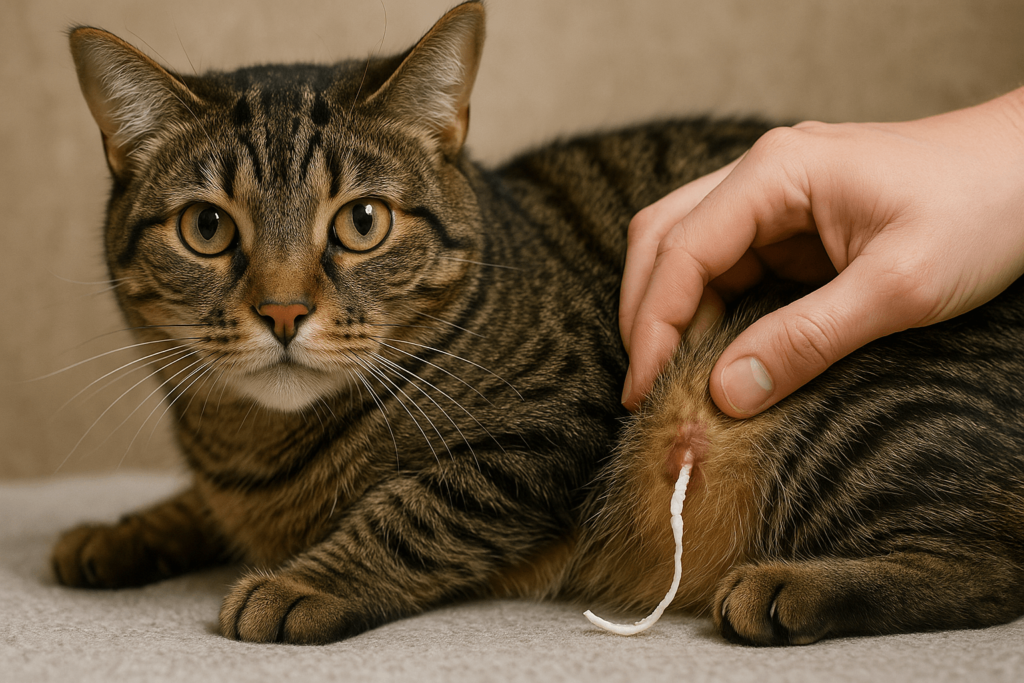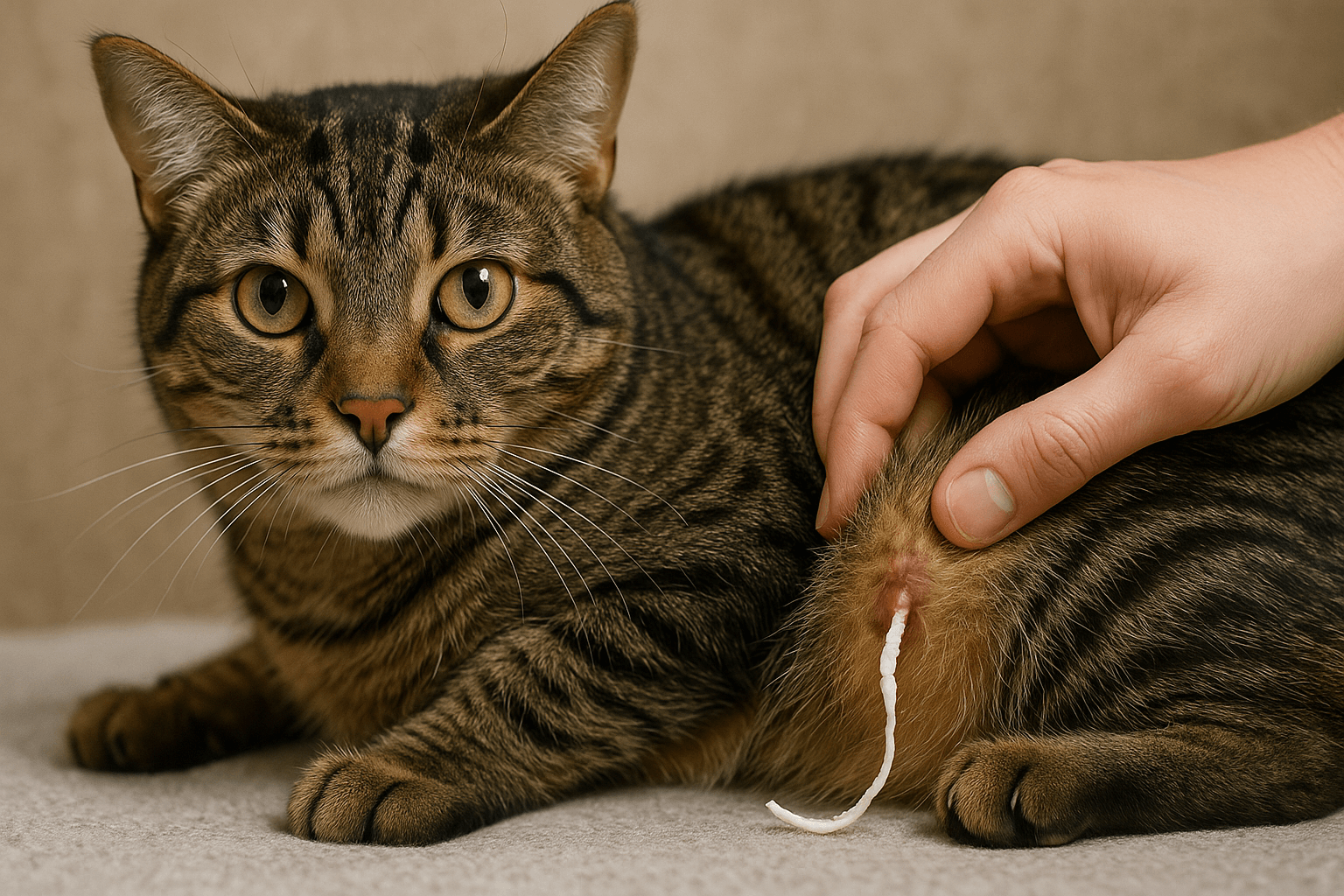How to Know If Your Cat Has Tapeworm
Tapeworms are one of the most common parasitic infections in cats, yet many pet owners may not realize their feline companion is affected until symptoms become noticeable. These flat, segmented worms live in your cat’s intestines and can cause discomfort, weight loss, and other health issues if left untreated. But how do you know if your cat has tapeworm? Identifying the signs early is crucial for ensuring your cat receives timely treatment and preventing further complications. In this guide, we’ll explore everything you need to know about recognizing, treating, and preventing tapeworms in cats.
Signs Your Cat May Have Tapeworm
Detecting tapeworms in your cat requires careful observation of their behavior and physical condition. While some symptoms are subtle, others are more obvious indicators of an infestation.
Visible Worm Segments Around the Anus:
Tapeworm segments often appear as small, rice-like particles stuck to your cat’s fur near their rear end or in their bedding.Scooting Behavior:
Cats with tapeworms may drag their bottom along the floor to relieve itching caused by the parasites.Weight Loss Despite Normal Appetite:
A cat infected with tapeworms might lose weight because the parasite absorbs nutrients from their food.Vomiting or Coughing Up Worms:
In severe cases, cats may vomit or expel whole tapeworms, which can be alarming but confirms the presence of an infestation.Excessive Licking of the Rear Area:
Cats may lick their hindquarters excessively in an attempt to soothe irritation caused by the worms.
If you notice any of these signs, it’s important to consult a veterinarian promptly to confirm the diagnosis and begin treatment.

How Tapeworms Are Transmitted to Cats
Understanding how tapeworms spread can help you take preventive measures to protect your cat from infection. These parasites rely on intermediate hosts to complete their life cycle.
Ingestion of Fleas:
Fleas are the primary carriers of tapeworm larvae. Cats often ingest fleas while grooming themselves, unknowingly introducing tapeworms into their system.Eating Infected Rodents:
Outdoor cats or hunters may contract tapeworms by consuming rodents or birds that harbor the parasite.Exposure to Contaminated Environments:
Cats living in areas with poor sanitation or high flea populations are at greater risk of contracting tapeworms.Contact with Other Infected Animals:
Sharing spaces with infected animals increases the likelihood of exposure to tapeworm eggs or larvae.Improper Deworming Practices:
Failing to administer regular deworming treatments leaves cats vulnerable to recurring tapeworm infections.
By addressing these transmission routes, you can significantly reduce your cat’s chances of becoming infected.
Check this guide 👉Tapeworms in Cat Vomit: Best 7 Expert Tips!
Check this guide 👉Tapeworm vs Roundworm in Cats: Best 7 Expert Tips!
Check this guide 👉Rice Tapeworms in Cats: Best 7 Expert Tips!
Preventing Tapeworms in Cats | Treating Tapeworm Infestations |
|---|---|
Regular flea prevention and control | Administer prescribed deworming medication |
Avoid letting cats hunt rodents | Clean bedding and living areas thoroughly |
Maintain good hygiene in the home | Monitor your cat for signs of reinfestation |
Schedule routine veterinary check-ups | Follow up with vet after treatment completion |
Keep cats indoors to limit exposure | Isolate infected cats from other pets temporarily |
Steps to Take if You Suspect Tapeworms
If you suspect your cat has tapeworms, acting quickly is essential to ensure their health and comfort. Here’s what you should do next.
Collect Evidence:
Gather any visible worm segments or fecal samples to show your veterinarian for accurate diagnosis.Schedule a Vet Appointment:
Visit your vet as soon as possible to confirm the presence of tapeworms and discuss treatment options.Prepare for Deworming Treatment:
Most vets will prescribe oral or topical medications specifically designed to eliminate tapeworms.Clean Your Home Thoroughly:
Wash your cat’s bedding, vacuum carpets, and disinfect surfaces to remove any lingering eggs or segments.Implement Flea Control Measures:
Since fleas are a primary source of tapeworm transmission, use effective flea prevention products moving forward.
Taking these steps ensures a swift recovery for your cat and minimizes the risk of reinfection.
Long-Term Strategies for Preventing Tapeworms
Preventing tapeworms requires ongoing effort and vigilance. By adopting these habits, you can keep your cat healthy and parasite-free in the long run.
Use Monthly Flea Prevention Products:
Consistent flea control is the first line of defense against tapeworms, as fleas carry the parasite’s larvae.Discourage Hunting Behavior:
If your cat enjoys hunting, consider using deterrents or keeping them indoors to reduce exposure to infected prey.Perform Routine Fecal Exams:
Regular vet visits that include fecal testing can catch tapeworms early before they cause significant harm.Educate Yourself About Parasites:
Understanding how tapeworms and other parasites operate empowers you to make informed decisions about your cat’s care.Maintain a Clean Environment:
Regular cleaning and proper waste disposal minimize the risk of contamination in your home.
With consistent effort, you can create a safe and healthy environment for your feline friend.
Common Misconceptions About Tapeworms
Many myths surround tapeworms in cats, leading to confusion among pet owners. Clearing up these misconceptions helps promote better understanding and care.
Myth: Tapeworms Are Always Visible:
While segments may sometimes be seen, tapeworms often remain hidden inside the intestines until symptoms develop.Myth: Only Outdoor Cats Get Tapeworms:
Indoor cats can also contract tapeworms through fleas or contaminated items brought into the home.Myth: Deworming Once Is Enough:
Regular deworming is necessary, as reinfection can occur without ongoing prevention.Myth: Tapeworms Don’t Affect Adult Cats Seriously:
Even adult cats can suffer from malnutrition and discomfort if tapeworms are left untreated.Myth: Flea Treatments Alone Prevent Tapeworms:
While flea control is vital, additional measures like hygiene and monitoring are equally important.
Dispelling these myths ensures you approach tapeworm prevention and treatment with accurate information.
Natural Remedies for Supporting Deworming Efforts
While veterinary treatments are essential, natural remedies can complement professional care and support your cat’s recovery.
Pumpkin Seeds:
Ground pumpkin seeds act as a natural dewormer by paralyzing parasites and aiding their expulsion.Diatomaceous Earth (Food Grade):
This powder dehydrates tapeworms internally, helping to eliminate them from the digestive tract.Probiotics:
Adding probiotics to your cat’s diet supports gut health during and after deworming treatments.Herbal Supplements:
Certain herbs, like wormwood and cloves, have antiparasitic properties but should only be used under veterinary guidance.Hydration and Nutrition:
Ensuring your cat stays hydrated and eats nutrient-rich food aids recovery and strengthens their immune system.
Natural remedies can enhance your cat’s overall well-being but should never replace professional medical advice.
How to Discuss Tapeworm Concerns with Your Vet
Talking to your veterinarian about tapeworms can feel intimidating, but preparation ensures productive conversations.
Describe Symptoms Clearly:
Provide detailed descriptions of any unusual behaviors or physical changes you’ve observed in your cat.Bring Samples for Testing:
Collect worm segments or stool samples to give your vet tangible evidence for diagnosis.Ask About Prevention Strategies:
Inquire about effective flea control methods and dietary recommendations to reduce future risks.Request a Follow-Up Plan:
Ensure your vet outlines a clear timeline for monitoring your cat’s progress post-treatment.Stay Open to Questions:
Be ready to answer questions about your cat’s lifestyle, diet, and environment to help identify potential causes.
Effective communication with your vet ensures your cat receives the best possible care and guidance.
Frequently Asked Questions About Tapeworms in Cats
Can humans get tapeworms from cats?
Yes, humans can contract tapeworms if they accidentally ingest infected fleas, though this is rare with proper hygiene practices.
How long does it take to treat tapeworms?
Most treatments eliminate tapeworms within a few days, but follow-up care may be necessary to prevent reinfestation.
Are over-the-counter dewormers effective?
Over-the-counter options exist, but prescription medications from your vet are generally more reliable and tailored to your cat’s needs.
Can kittens get tapeworms?
Yes, kittens are especially susceptible due to weaker immune systems. Early prevention and treatment are critical for their health.
What happens if tapeworms go untreated?
Untreated tapeworms can lead to malnutrition, weight loss, and serious gastrointestinal issues in cats.
Keeping Your Cat Healthy and Tapeworm-Free
Tapeworms may seem like a daunting issue, but with proper knowledge and preventive measures, you can protect your cat from these pesky parasites. Recognizing the signs early, seeking veterinary care, and maintaining a clean, flea-free environment are key steps in safeguarding your feline companion’s well-being. Remember, prevention is always better than cure—by staying proactive, you can ensure your cat remains happy, healthy, and free of tapeworms for years to come.
How Do I Know If My Cat Died Peacefully? A Gentle Guide for Heartbroken Owners Losing a cat is not just …
Why Do Abyssinian Cat Colors Matter? Best 7 Expert Tips! Discover the genetics, rare hues, and care secrets behind Abyssinian coat colors for a healthier, happier cat.
Cat Enrichment Activities: Best 7 Expert Tips! Unlock your cat’s natural instincts with proven strategies for mental stimulation, physical health, and lasting happiness.
Natural Cat Deterrent: Best 7 Expert Tips! Discover safe, effective ways to keep cats away without harm—using science-backed, pet-friendly methods.




